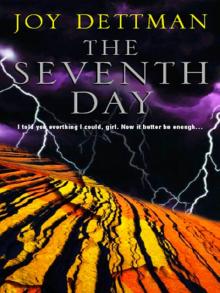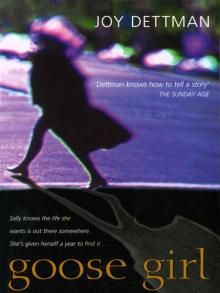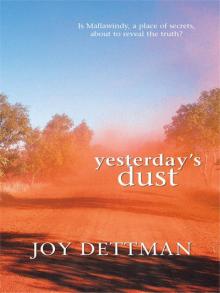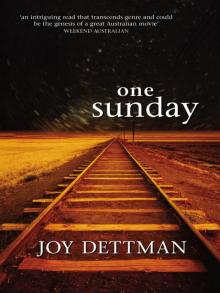- Home
- Joy Dettman
Diamonds in the Mud and Other Stories Page 18
Diamonds in the Mud and Other Stories Read online
Page 18
Fried rice? Yes. Oh, and golden chicken floating in an uncharted sea of sauce. It drips to the table, overflowing with promise.
Her chin rises. Her head turns. Darting cockroaches search the food hall. She stands, sniffs the air, picks up her plate of blighted potato with its coleslaw, its unmelted cheese and bacon bits congealing in sour cream. She’ll take it back, get a refund. She is on the scent of a new and more fulsome love.
Summer Pink
‘I say . . . I say . . . ’ Granny tried to gain her son’s attention while her cup dribbled tea onto her lap. ‘I say. It was George Potts. George Potts. Ah, you rowdy mob of sods,’ she muttered.
The babble of a hundred and fifty guests spilled through her Camberwell house – half-forgotten grandchildren, great grandchildren she had never met, in-laws she had no desire to meet: they were all here. They’d sat their offspring on her lap, coerced them into kissing a shrunken curiosity while cameras clicked and flashlights blinded. The newspaper photographers had been here, wanting a shot of her holding on to Lizzie’s telegram.
‘Everyone shoving cameras up my nose just because an old body’s turned a hundred. Might as well hang a sign around my neck. Get your last chance photographs here,’ she muttered. For an hour she had been the centre of attraction, now she was forgotten, left alone in her wheelchair in front of her cake.
She scratched at her chin then her hand reached higher to scratch at her ear, her brow. No amount of scratching could relieve that itch. It was an internal thing, deep beneath her skin where she wasn’t a hundred years old, where she was still Kathleen.
‘I say, I say . . . ’ Again she tried, determined to capture a listener before the minute hand passed twelve. Clocks obsessed her. Fifty times a day she asked the time, driving Dora, her daughter, mad, but from her chair, she could see that marble clock, perched on the mantelpiece like a malevolent god, counting her life’s seconds down to nil. Its chimes in the night were a death knell. She’d told Dora not to wind those chimes, but each week she turned that key, wishing it was a dagger in Granny’s failing heart.
Dora was her last born. Of the nine children she’d given life, only three had survived beyond sixty. They were here today, the two boys and Dora, their eyes never leaving the diamond and ruby brooch pinned to Granny’s lapel. Each considered it his own property though they had no claim on it. Maybe she’d find a way of taking it with her when she went. It was all a matter of willpower, and though Granny’s legs had given up the struggle twelve months ago, her will had not.
‘I say. I say.’
A child, a small thing of three or four, sidled closer to her, or to her cake. He looked like her second born, a wee mite she’d lost to diphtheria.
‘You tell ’em for me, laddie, that they dunno what they’re talking about. It was George Potts who used to be the milkman here during the war. He married Lou Evans, who used to run a stall at the old market. She had a club foot, wore a built-up shoe.’
The boy was more interested in her cake.
‘Her old mother always blamed the priest we had here during that time. Swore he put a jinx on her for marrying out of the church. He had a club foot too, you see. They reckon Lou’s father also blamed the priest, but not for the same reason. If you get me drift, laddie.’ She jabbed the boy with a witch’s finger and chuckled.
‘Can I watch TV, Gwanny?’
‘What do you want with that ratbag thing?’ She had captured her listener and wasn’t about to let him get away. Sucking in a breath, she readied herself for the next instalment of yesterday. Today was aches, pills, napkins and wheelchairs, and a daughter who wanted her in her grave. Yesterday was the only thing worth living for.
‘Time waits for no man, laddie,’ she said, glowering at two youthful females now standing in front of that clock, hiding time. ‘What’s the time? Can you see the clock?’
‘It’s play school when it get on fwee.’
‘What’s it on now?’
‘I don’t know yet.’
Granny leaned to the side. She had to keep her eye on time or it got away from her. Every minute was important. Then a baby cried and the women moved, just as the small hand jerked forward, deducted another second from Granny’s life.
‘Babies,’ she muttered. ‘Each one that comes moves an old body one more rung down the ladder to her grave.’
‘My pussycat got dead and Mummy put him in a gwave and we put some flowers on.’
Granny nodded, spilled a little more tea onto her dress bought new for this day. An ugly dress, it looked like Dora: mean, grey, stale. ‘I wanted to buy my own dress for the party, laddie. I told her to take me to that little shop in Burke Road. I bought my first party dress there. Pink. Summer pink, it was. She wouldn’t take me. She hasn’t taken me out of this house in three years – I’d be better off in a home for old codgers,’ she said as Dora reached for the cup, wiped at the spill with a serviette.
‘Be a bit more careful, will you.’
The cup handle, gripped by Granny’s twisted fingers, spilled the last of the tea onto her bitter frock. ‘For goodness sake, give it to me, Mum, and let me put that brooch away. There are too many strangers around today.’
‘I didn’t invite ’em, and time enough to hide it away when I’m dead,’ Granny said, giving up the cup, then reaching with those twisted fingers for her lapel, her old jaws gnashing, ready for war.
‘You’re a cantankerous old bitch,’ Dora hissed. ‘Look what you’ve done to my carpet.’
‘It’s my carpet, girl, my house, and don’t you go forgetting it.’
‘I put myself out today to give you this party.’ Dora swiped at the dress with the serviette. ‘And do I get one iota of gratitude for it? I don’t know why I stay here with you.’
‘Because no one else will give you house-room – so stick that in your pipe and smoke it.’
Dora walked away and the old dame turned back to the boy. ‘Sticks me in my chair in my grey dress and me napkins and expects me to shut up and do as I’m told, laddie. There was a time when no one ignored me. I was the belle of Camberwell when I was a girl. Hair down to me knees, I had.’
‘You haven’t got no hair now, Gwanny,’ the boy said, eyeing the pink skull beneath white cotton wool wisps.
‘And isn’t that the truth,’ she cackled, aiming her hand at a bowl of chocolates and handing him the spoils. ‘I was always one for the truth, laddie.’
An unfamiliar face leaned close and a stranger’s fingers reached for her brooch. They all knew about it, though few had seen it before. ‘Having a good time, Granny,’ the stranger said.
Granny slapped at the hand. Jamey had given her that brooch when she was seventeen. It was one of his family’s heirlooms, worth a fortune back then, worth a king’s ransom now.
‘I only wanted to look at it, you niggly old bugger,’ the stranger said. ‘Aunt Dora is a bloody saint to put up with you.’ She moved away, but Granny’s hand remained, patting her brooch, her eyes seeking, finding Saint Dora, seated on the couch, a new infant flopping around on her lap.
‘It won’t bite you,’ Granny said. ‘It’s got no teeth yet.’ No one heard her. Old age made her invisible, except to the three or four year old who had attached himself to her chair. ‘I dressed my babies in white, laddie. Wore me knuckles to the bone keeping them in white. Now they put ’em in football colours. Want ’em to grow up fast, free ’em to go out to the dance halls, get another man to warm their beds.’
‘Can I have a’ nover chocolate, Gwanny?’
‘Take what you can get while you can. You’ll be a long time dead. Go on, take a handful, put them in your pockets.’
She cackled as she watched him fill his pocket with chocolates. Plenty more where they came from – half of the guests had brought her chocolates and the other half brought flowers. They could have brought her a pretty scarf or a nightie with lace on it, a nice bit of music to listen to. Oh no . . . that would have taken time, that would have taken thought. Dora would eat the
chocolates, sit in front of the television, watching her soap operas and stuffing chocolates. They wouldn’t sweeten her up.
‘Peel me one, laddie. My old fingers are not much good these days.’
Impatient then, she watched small fingers struggling with purple foil, her mouth opening, closing, eager for those little fingers to feed her a sweet. Her lips closed over it and her tongue caressed, pressed it. Content a while, she sucked on sweet, savouring sweet while squinting at one of the grandsons sorting through the telegrams.
‘I see you got one from the Prime Minister too, Gran,’ he said.
‘Bleeding telegrams. I never liked telegrams.’ The brooch. She’d forgotten the brooch. Her arm jerked up and her fingers found it. She sucked in a breath, eased it out, felt her heartbeat skip, still, then flutter into life again. That brooch was all she had left of Jamey, her first husband, dead since a bleeding telegram.
‘He was coming home to me, laddie. He lived through that war and was coming home when he got struck down by the Spanish Flu on the ship bringing him back.’
Telegrams – death bringers, that’s all they were. What right did Lizzie and what’s-his-name have to send telegrams? They could have sent a nice card with something pretty on it. Jamey used to send her pretty cards, and she’d kept every one, in her box, with her brooch. They’d sell them when she was gone – sell them for a pittance to some collector who’d read Jamey’s words. They wouldn’t mean a thing to him.
The boy wriggled from foot to foot, then quickly left her side to walk tight legged to one of the great granddaughters. She watched him tug at her skirt.
Granny lifted her left buttock, scratched. The itch wasn’t there. It was in her back, her neck, her elbow. She was tired now, and those pastries and chocolates grumbling in her bowel. She’d have to go soon.
Alone in the crowd, Granny closed her eyes and dreamed a while of a buggy ride to Box Hill with Jamey. Her dress was pink, light pink for summer. Her heavy hair pinned high, his engagement brooch on the shoulder of her gown. Katherine Stuart, barely seventeen and she’d won the prize of Camberwell. How she had loved him. He’d taken the pins from her hair on their wedding night, surprised it was so long, and he’d unbuttoned her gown. Lord, how they had loved. ‘What a handsome pair,’ everyone said. ‘What a fine –’
Dora jolted her chair and Granny was old again, Jamey dead once more. It was time for her heart pill.
‘Didn’t I take that one, Dora?’
‘Just take it and don’t argue with me, Mum.’
Blue pills, pink pills, white, orange. They’d had a busy morning, folk ringing up, folk turning up with flowers. Hard to keep track of those pills. She opened her mouth, washed the pill down with water – washed it halfway down.
Then she remembered taking that phone call from New Zealand, remembered how that blue pill had stuck in her throat. Those blue ones tasted bad.
‘I say, Dora, I took that blue one . . . ’ But Dora was gone, and from nearby a baby bellowed. ‘I took it when I was on the phone.’ Cackling laughter to the left, nasal tones rising and falling, television in the next room, droning on like the city’s heartbeat. ‘I say, Dora.’
What did it matter what an old body said these days? She looked at her mutilated cake, her hand considering a snatch for the final slice, needing something to wash the taste of that pill away. Too hard. Life got too bleeding hard when you turned a hundred and you’d buried those you’d loved too many years ago.
Poor old Dora. What age was she now? Born when I was thirty-seven, one of Bert’s. Damn fool of a woman I was, marrying him. Her eyes searched the crowd, found Dora standing beside the passage door, staring at her, or at her brooch. ‘Mean as a meat axe, old Bert was, and that girl is her father reborn,’ Granny muttered. ‘Lost him to a heart attack back in fifty-five, and glad to get shut of him too.’ Old eyes searching found her two surviving sons. They were born to Robert, her second husband. He’d given her four sons then died under the wheels of a truck, leaving her to raise them. She’d been tempted to sell that brooch a dozen times. Couldn’t do it. Jamey, her first and only love, had given it to her.
She scanned the room, seeking his finer stock, and she found that wee laddie again. He was somehow connected to her Jamey, she knew it. He had his eyes. Wide open, honest eyes.
‘I say . . . I say. The laddie wants to wee. Are you all blind to his needs?’
They were ignoring him like they ignored her, letting him wet his pants. She watched his little face, wishing for the use of her legs, or for her eyes to be veiled by cataracts, to not see so much, or for her brain to be muddled, to not know so much. But she did know. Her memory never failed her.
And she knew she’d taken her blue pill this morning too; she’d spilt her apple juice all over the telephone table while she talked to her granddaughter in New Zealand. She didn’t often get apple juice. She knew too that one of those blue pills could keep her old heart beating and two could stop it.
There was a dark stain at that little laddie’s feet now. One of the great granddaughters looked down at that stain. She turned to the boy, shook her finger at him, then stepped quickly away. The boy, his wide eyes, tear filled, wandered back to the comfort of Granny and her cake.
Her gums gnashed as Granny aimed her hand at the cake, snatched the last slice and pushed it at the boy. Then her weary old hand fell to pat the seat of his wet pants, leaving cream and cake crumbs there.
‘Mummy’s going home ’cause I wetted my pants,’ he explained.
‘Never you mind, laddie. I do it myself regular.’
Too tired, just too damn tired, but that hand moved up to her diamond and ruby brooch. She couldn’t find the pin and the boy’s mother was calling, so she tugged at it, ripping it from the cheap grey lapel. ‘Here, my very dear little laddie. Stick it in your pocket with your chocolates. Quick. It belonged to your great, great granddaddy. Take it home and keep it till you’re a big boy.’ He took it, put it in his pocket and walked to his mother, waiting beside the door, and Granny’s old heart pained for the loss of him.
Then she jerked forward in her chair. The door was open and she wasn’t seeing what she should have been seeing on the other side. She could see Jamey out there. And didn’t he look the fine gentleman amongst the rest of those louts.
‘I’m over here, Jamey, love! Over here.’
How she’d given Dora the slip, she didn’t quite know, but she was out that door, out of that wheelchair too, and she’d got rid of that mean grey dress. She was wearing her pink, her summer pink, bought from the little shop in Burke Road. And there was Jamey, holding the garden gate wide for her.
‘Mum! Mum!’
Before Dora could catch her and bring her back, she was through that gate and gone.
The House Raising
FATHER OF TEN LOST TO RAGING RIVER
Constable Johnson said yesterday that the search for Jim Wilson, father of ten, had been called off until flood waters recede.
Constable Johnson, and publican Michael Lawton, have organised a working-bee to rehouse the grieving family who fled their house as water lapped at their door. Donations can be left at the police station.
That’s me they’re writing about, Constable Johnson, though back then they all called me Bob – except the widow. I would’ve been in me mid thirties in ’51, which was the year of them big floods. It was also the year my missus took off and I’d asked for a shift to some place a long way away from her and that worming, weaselling, little red-headed mongrel that broke up my marriage.
They sent me up to Balwarin, and I arrived there the day Jim Wilson disappeared in the floods. He was a no good, no-account bludging mongrel, but the town folk, carried away by a local tragedy, wanted to do something for the widow who lived in a grain shed with her ten kids, so we started up this fund. I did a bit of talking to newspapers, which got us a bit of advertising for donations. I’d asked for money, but a lot of folk took me wrong and every useless bit of junk, every stick of unwanted
furniture in a twenty mile radius started turning up on me front veranda until I’m tripping over it every time I walk outside me bloody door.
Me lock-up was brand new – the only place in town that was, mind you. They’d built it out of cement brick after the Davis twins demolished the old joint when my predecessor locked the mad bastards in together one night. Any rate, being brick, and jammed in between the shire hall and me station cum residence, it didn’t see a lot of sun – second coolest spot in town, folk said. By January ’52 I hadn’t used it – or not for its intended purposes, due to it being chock-a-block full of the better bits of junk donated to the widow Wilson.
There were tables and three legged chairs. There were iron beds. There were doors, old windows, crates and chaff bags overflowing with worn-out rags. There were old shoes, hats, pots, pans, books – you name it, I was tripping over it. The big Depression must have made hoarders of a whole generation – like them that lived through it, never did believe the good times was gunna last, so they saved their junk for a rainy day. Well, until the year of that flood, it mustn’t’ve rained in Christ knew how many years, so all of their bloody junk was now raining down on me.
Twice that working-bee to rehouse the widow got buggered up by something. In November the two rooms a local cocky was donating – it was gunna form the bulk of the rehousing project – was still surrounded by floodwaters. The next time I rounded up a team, we was getting wheels under the rooms when a big jack slipped and Max Davis’s hand was in the way. I ended up racing him to the nearest hospital, twenty miles down a bumpy road. So Christmas come and went, Jim Wilson’s carcass remained missing – most in town reckoned there’d be nothing left of him to find anyway. We had wild pigs riddling the forest out back of town, we had foxes – not to mention crayfish and yabbies in the river.
It’s normal human nature for folk to get carried away by a bit of local drama; the whole town pledged its support when it happened but, good or bad, news never stays news for long, and the widow’s grain shed with its lean-to kitchen, where she’d been living since her marriage, didn’t get one drop of water inside it. Her chooks had taken to the trees, her cows had swum to high ground and even her kids hadn’t been too inconvenienced. They’d always rowed an old boat across the river to school, which was the only way for the poor little buggers to get there, unless they wanted to walk five miles, twice a day, around by the bridge. If the truth was to be told, the widow’s only loss was one no-account, layabout mongrel who had been bludging on her for sixteen years. The Davis twins, both of them, were more than ready to fill that space in her bed, as was thirty-odd womanless, jabbering reffos Pig Iron Bob had sent to town to plague me.

 The Hope Flower
The Hope Flower Trails in the Dust
Trails in the Dust Diamonds in the Mud and Other Stories
Diamonds in the Mud and Other Stories Moth to the Flame
Moth to the Flame The Tying of Threads
The Tying of Threads Wind in the Wires
Wind in the Wires The Seventh Day
The Seventh Day Thorn on the Rose
Thorn on the Rose Jacaranda Blue
Jacaranda Blue Mallawindy
Mallawindy Ripples on a Pond
Ripples on a Pond Goose Girl
Goose Girl The Silent Inheritance
The Silent Inheritance Henry’s Daughter
Henry’s Daughter Yesterday's Dust
Yesterday's Dust Pearl in a Cage
Pearl in a Cage One Sunday
One Sunday